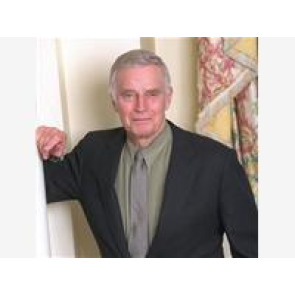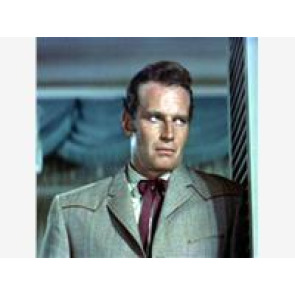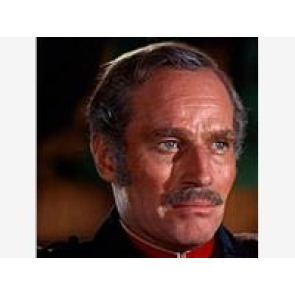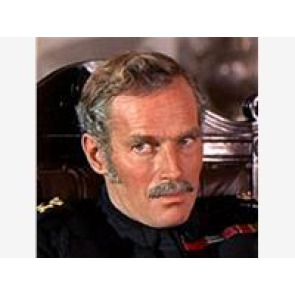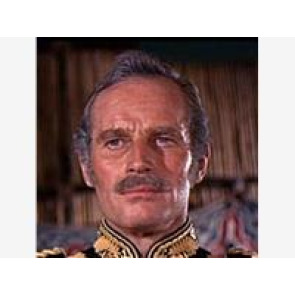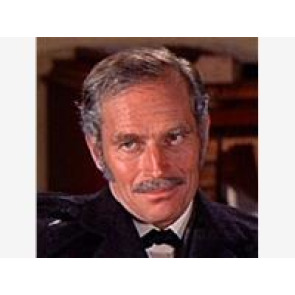CHARLTON HESTONCharlton Heston, who died on 5 April, 2008, entertained millions as the handsome hero of epic action films of the 1950s, '60s and '70s, featuring in some of the most successful and iconic movies of all time.
He starred in big-budget, cast-of-thousands movies like The Ten Commandments (1956), Ben-Hur (1959), Planet of the Apes (1968) and Julius Caesar (1970) and was famous for his rugged good-looks and intense acting.
He was also known for his political activism, being an early supporter of the civil rights movement, a Democrat-turned-Repu blican Party campaigner and president of the National Rifle Association between 1998 and 2003.
Charlton Heston was born John Charles Carter on 4 October, 1923, in Evanston, Illinois. When he was 10 his mother, Lila, divorced mill-operator Russell Carter, married the well-off Chester Heston and moved to Chicago.
He enrolled at the drama programme of his new school and earned a scholarship to Northwestern University from the Winnetka Community Theatre. He made his film debut at 17 in an ambitious amateur adaptation of Ibsen's notoriously tricky Peer Gynt, playing the eponymous Norwegian.
After completing his studies and two years as a B-25 radio operator and gunner in the US Army Air Corps (during which time he also married fellow student Lydia Clarke), he resumed acting, performing on Broadway and teaming up with his Peer Gynt colleagues for the first sound adaptation of Julius Caesar (1950) playing Marc Antony on screen for the first of three times.
He was propelled to stardom in Cecil B DeMille Oscar-winning spectacular circus drama The Greatest Show on Earth (1952). After several busy years Mr Heston reunited with Mr DeMille for The Ten Commandments (1956) to head up a star cast including Yul Brynner, Anne Baxter and Edward G Robinson. He was cast in the role of Moses because the director saw a resemblance between him and a statue by Michelangelo.
Now seen as one of Hollywood's biggest leading men, he worked with the industry's top names, such as Orson Welles on Touch of Evil (1958) and Gregory Peck and Jean Simmons in The Big Country (1958). In 1959 he scooped the Academy Award for 'Best Actor' in Ben-Hur, one of 11 Oscars the seminal historical epic won.
Numerous historical and religious roles followed, including El Cid (1961), The Greatest Story Ever Told (1965) and Khartoum (1966). "They seem to think I have a medieval face," he once joked. Despite his blockbuster credentials, he always strived to retain some artistic integrity and would turn down roles he believed to have dubious political themes.
1968's fantasy adventure Planet of the Apes helped him branch out into different genres, with several more sci-fi roles - The Omega Man (1971), Soylent Green (1973) - though he was still prone to going back in time as well, including a part in The Three Musketeers (1973) and two outings as Marc Antony in Julius Caesar (1970) and Antony and Cleopatra (1972), the second of which was his directorial debut, not altogether well-received.
His output in the eighties was largely television-based and in the following decades he lent his distinctive tones to a lot of movie voice-over work. This relatively easy workload left plenty of time for his other pursuits
As early as 1956 he was involving himself in politics, supporting Democrat presidential candidates. In 1963 he marched with Martin Luther King before it was fashionable for white entertainers to support the civil rights cause and in the late '60s he petitioned for gun control laws in the wake of President Kennedy's assassination.
This was in stark contrast to the 1980s, when he would change his allegiances to the Republicans and support Presidents Reagan and Bush, become synonymous with the right to bear arms (Al Gore would have to prise his gun from his "cold, dead hands" he said in a controversial speech) and be accused of homophobia. His efforts for the Republicans were rewarded in 2003 when he was given the Presidential Medal of Freedom by George W Bush.
His last years were characterised by illness. In 1998 he had a hip replacement and was diagnosed with prostrate cancer shortly afterwards. This was treated successfully with radiotherapy but in 2002 he announced he was suffering from Alzheimer's disease. He retired from acting the following year and his health became steadily worse until his death at the age of 84. He was survived by his wife of 64 years, Lydia Clarke.
Keep me informed of updates

